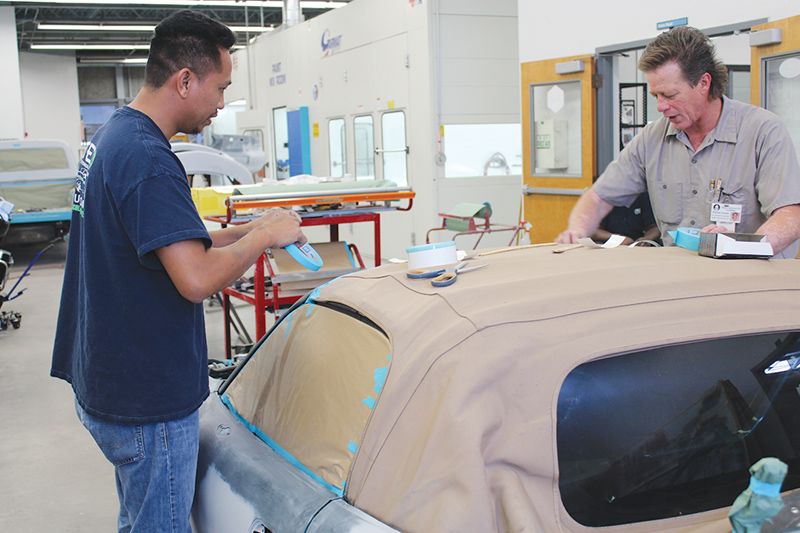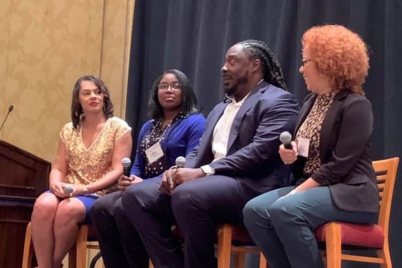BY FRANK DROUZAS, Staff Writer
ST. PETERSBURG — These students are encouraged to get their hands dirty in class. For the participants of the Automotive Collision Repair and Refinishing course at the Pinellas Technical Education Center (pTEC), it’s all in a day’s work. And with tasks involving tools of the trade such as welding torches and paint spray guns, they learn a thing or two about working with their hands.
Available only at the St. Pete campus of pTEC, located at 901 34th St. S., the course is 1400 hours and is divided in two parts. The first half focuses mainly on shop and safety skills, welding, painting, analyzing body damage and repair and replacement of outer body parts.
pTEC’s Collision Repair
“In the second half you get into heavier collision stuff,” said Steve Passe, one of the program’s three instructors. “We cover everything from A to Z, as far as repairing a damaged car.”
Passe, who has over 20 years of teaching experience under his belt, got his start in the business while still at Gibbs High School.
“I was self-taught, and then I went to auto mechanic school at the city center as an elective offered to Gibbs students,” he recalled.
He chose the right path for a man who loves to work with his hands, and called the pTEC auto body shop a “hidden gem,” adding that they repair everything from small dents to huge collision damages to bumpers, fenders, doors or any part of the body.
According to Passe, insurance type repair work drives most of the business as the course provides on the job training. The pTEC shop will happily take in “live work” from anyone needing repair jobs for their cars. The program uses top of the line materials and only charges customers for the materials, as the labor is free.
“Turnaround is longer than a pro body shop because they are students,” Passe said, but affirmed that doing a quality job is important. “If it’s not coming out right we’ll stop and make them redo it. We’re really proud of how the product looks when it comes out.”
In fact, he insisted there is no inferior work done at the pTEC shop, like at some franchise places. This includes the auto paint jobs, which can vary from the basic to the elaborate. But whatever the job may be, Passe insisted that it is quality work.
“People think they can get their whole car painted for $200,” Passe said. “We teach students the other side of that. We’re doing the job that would be a $4,000 or $5,000 overall paint job. We take off all the belt moldings, the door handles, everything and strip the car down the way it should be done.”
They even touch upon elaborate designs, like flames emblazoned on the side of the car.
“We’ve got everything that your big dealerships have,” Passe stated proudly. “Paint mixing system, computerized measuring system. We’re fully self-contained.”
Students also get a thorough course on analyzing body damage, creating damage reports and hand writing estimates. Once they roll their sleeves up, they often start out working on donated cars but get more of the full, on-the-job experience when they work on actual client automobiles. Such live work, Passe explained, puts more pressure on the students to perform and excel.
There are typically 35 to 45 students in a class—with high school students working side by side with some classmates who could be their parents’ age—proving that the program attracts people of all ages and backgrounds.
“I have a lady who is 50 who just started,” Passe said.
He explained that at the outset of the course the students start learning as a group, and in time move on to tackling their own individual projects.
“It’s more one on one instruction,” he said. “You can’t really put two or three guys on certain jobs.”
Talented pTEC students have even competed in the renowned SkillsUSA competition, which includes categories in automotive refinishing technology, and have even made it all the way to the nationals of the prestigious contest.
“It’s a great thing for the students to do,” Passe said. “Sort of like going to the Olympics. It helps put the school on the map so it’s a good thing for the program.”
And as long as students keep in contact, they can count on pTEC’s help with job placement.
“We want to put these guys in good reputable shops that are doing the high quality work,” Passe stated. “I’ve got guys all over the county working in shops. It’s a craftsman art, like building a house. It’s a ‘get your hands dirty’ type of thing.’”
The next Automotive Collision Repair and Refinishing class starts in August, so if you’re interested in this career path, please visit myptec.org or call 727-893-2500. Financial aid is available.
To reach Frank Drouzas, email fdrouzas@theweeklychallenger.com.









Hello Steve,I am a father of 3 boys and have a 06 Dodge Ram 1500 quad cab truck that is in need of some love again in the paint department!! The truck is sound body wiss, just has a black right passangers side door .The truck is factory White w a few dings here and there.I would like to get it fully painted White again, maybe w small flakes in clear coats if possible? Also have rims to paint White as well, I’d like to get it done one: to save money and two: to let students get a Chance to Excel on their passionate career:-) My 3 boys thought this would be a great idea, considering they’re in school studying themselves! Steve if you have any information on this program and what you guys do could you please email me back and let me know how I could become a part of this program. Thank you very much Bill Haverty